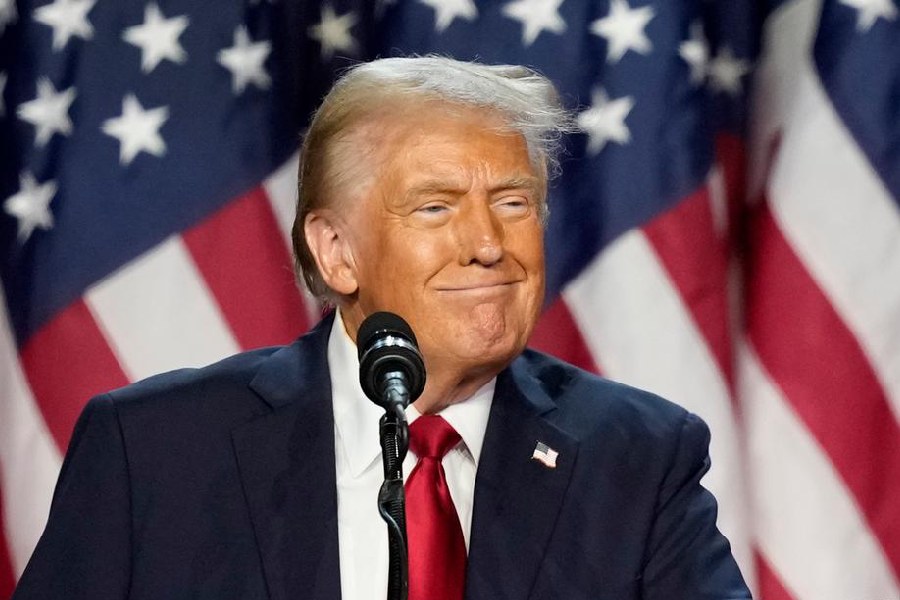US president-elect Donald Trump, who enjoys very good relationship with Prime Minister Narendra Modi, is expected to build on the progress made during his first term and continue strengthening ties with India, his South Asia point-person at the White House during his first term has said.
Speaking to PTI in an interview, Lisa Curtis, who served as deputy assistant to president Trump and as National Security Council senior director for South and Central Asia from 2017 to 2021, also said she expected the same bumps for India and the US, as in Trump's first term, including tariff, dependence on Russia over arms supply and oil purchase from Iran.
"I think that President (elect) Trump will pick up where he left off with India. He clearly has good feelings, goodwill toward India, and I really see this as an opportunity to just continue building the relationship and really solidifying that partnership," Curtis said.
During Trump's first term (2017-2021), there was an "elevation of the US-India relationship" because of the importance of India and its role in dealing with challenges from China, she said.
Curtis pointed out that there was also a notable mutual respect and personal connection between Trump and Prime Minister Modi.
"We could see that during the event when Prime Minister Modi addressed 50,000 Americans at the Astrodome in Houston. We saw that when President Trump addressed 100,000 Indians in a stadium in Ahmedabad. That relationship really helped cement a lot of the progress that was made," said Curtis, who is currently a Senior Fellow and Director of the Indo-Pacific Security Program at Center for a New American Security, a think-tank.
"Technology controls were lifted on India. India gained access to armed drone technology. Now it's buying 31 Sea Guardian predators. We saw the building up of not only the defence and security relationship, but also confidence and trust," she said, adding that the Quad was started during that period.
At the same time, there were a couple of bumps on this road during Trump's first term, she said.
"There were a couple of bumps in the road, and this was mainly when President Trump would tweet about the Indian tariffs. He really wanted American companies to have more access to the Indian market. He would often, before a meeting, tweet out something. It was almost a negotiating tactic, I think, that he was doing. He did this with many countries. That did cause some irritation in the relationship. But I don't think these tweeting incidents about Indian tariffs overwhelmed the broader relationship,” she said.
"We could probably expect similar things to happen in the future as well. But I think everybody's more prepared for Trump's style and his negotiation style. His very transactional approach, trying to get a good deal for the American people," she added.
Responding to a question, Curtis said the priority this time needs to be on the security partnership between the two countries. She added, "This is an area where the interests of both sides converge. Both the United States and India have a lot of concerns when it comes to China, such as its attempts to dominate the technology market and efforts to be the hegemon in Asia. Neither India, nor the United States want that to happen. So, they have a deep mutual interest in cooperating." "But I don't think we have realised the full potential of that kind of defence and security cooperation for various reasons. Both have major bureaucracies, their democracies, which can cause things to stall, to defense sales to stall. I think that that would be my hope, that there is a particular focus on really solidifying the defence and security relationship,” she said.
Curtis, however, said both countries could never enter an alliance but develop a partnership that is "short of an alliance". She hoped them to achieve a cooperation that deters China, but also prepares both countries in case of a crisis or conflict, be it in the Taiwan Strait, the South China Sea, or another flare-up on the India-China border.
She applauded Trump for picking Congressman Mike Waltz as his National Security Advisor and Senator Marco Rubio as Secretary of State, both China-hawk. She felt the second Trump term is unlikely to focus on Pakistan and one should not expect a major change on his Afghan policy.
The Trump administration will continue to try to convince India to reduce its dependence on Russian military equipment, Curtis said.
"There is a good case to be made that Russia is unlikely to be a reliable partner for India moving forward, given that it is being internationally isolated due to its illegal and unjustified invasion of Ukraine... But I don't think that the friction over India's relationship with Russia will be a primary feature of US-India relations. I think it's something that will be handled quietly, discreetly," she added.
Curtis said during Trump's first term, the US pressed India to cut oil imports from Iran due to sanctions. While India complied, it was a tough decision given its energy needs, proximity to Iran, the Iran-Pakistan dynamic, and the presence of a significant Shia population, which all influenced its stance.
"The Modi government was very strong in condemning the October 7 terrorist attacks in Israel and providing support for Israel. That policy between the Trump administration and the Modi government will be very similar. That of course, will have some impact on the Modi government's relationship with Iran," she said.
Except for the headline, this story has not been edited by The Telegraph Online staff and has been published from a syndicated feed.











